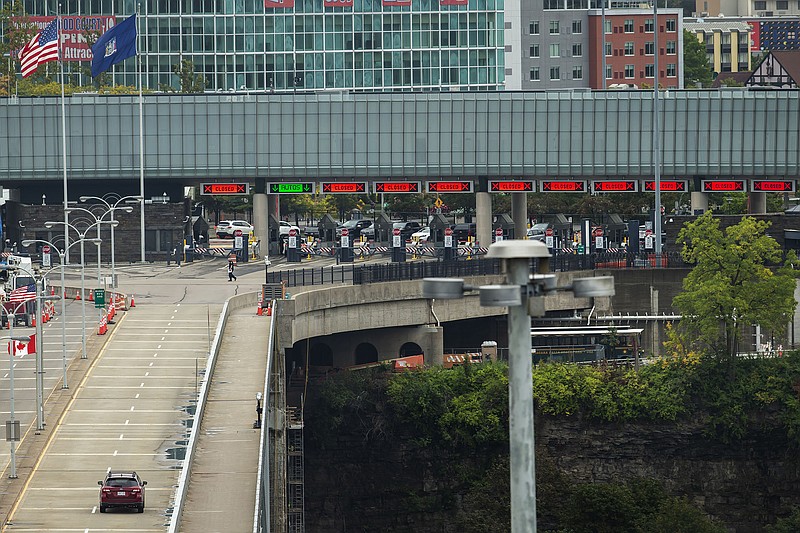SAN DIEGO -- Beleaguered business owners and families separated by covid-19 restrictions rejoiced Wednesday after the U.S. said it will reopen its land borders to nonessential travel next month, ending a 19-month freeze.
Travel across land borders from Canada and Mexico has been largely restricted to workers whose jobs are deemed essential. Starting in early November, new rules will allow fully vaccinated foreign citizens to enter the U.S. regardless of the reason. By mid-January, essential travelers seeking to enter the U.S. will also need to be fully vaccinated.
Shopping malls and big-box retailers in U.S. border towns whose parking spaces had been filled by cars with Mexican license plates were hit hard by travel restrictions.
San Diego Mayor Todd Gloria said the economic impact was hard to quantify but can be seen in the sparse presence of shoppers at a high-end outlet mall on the city's border with Tijuana, Mexico. The decision comes at a critical time ahead of the holiday shopping season.
[Video not showing up above? Click here to watch » https://www.youtube.com/watch?v=pHmlVCGvzlk]
In Nogales, Ariz., travel restrictions forced about 40 retail businesses to close on the main strip in the city of 20,000 people, said Jessy Fontes, board member of the Nogales-Santa Cruz County Chamber of Commerce and owner of Mariposa Liquidation Store, which sells household appliances. His sales fell 60%, and he considered closing but instead cut his staff from seven to two.
In Del Rio, Texas, Mexican visitors account for about 65% of retail sales, said Blanca Larson, executive director of the chamber of commerce and visitors bureau in the city of 35,000 people.
"Along the border, we're like more of one community than two different communities," she said.
The ban has also had enormous social and cultural impact, preventing family gatherings when relatives live on different sides of the border. Community events have stalled even as cities away from U.S. borders have inched toward normalcy.
In Sault Ste. Marie, Mich., where hockey and ice skating are ingrained, the Soo Eagles haven't had a home game against a Canadian opponent in 20 months. The players, 17 to 20 years old, have been traveling to Canada since border restrictions were lifted there two months ago. Now the U.S. team can host.
"I almost fell over when I read it," said Ron Lavin, co-owner of the Eagles. "It's been a long frustrating journey for people on a lot of fronts far more serious than hockey, but we're just really pleased. It's great for the city."
[CORONAVIRUS: Click here for our complete coverage » arkansasonline.com/coronavirus]
Fully vaccinated U.S. citizens and permanent residents have been allowed into Canada since August, provided they have waited at least two weeks since getting their second vaccine dose and can show proof of a recent negative covid-19 test. Mexico has not enforced covid-19 entry procedures for land travelers.
The latest move follows last month's announcement that the U.S. will end country-based travel bans for air travel and instead require vaccination for foreign nationals seeking to enter by plane.
The new rules only apply to legal entry. Those who enter illegally will still be subject to expulsion under a public health authority that allows for the swift removal of migrants before they can seek asylum.
Travelers entering the U.S. by vehicle, rail and ferry will be asked about their vaccination status as part of the standard U.S. Customs and Border Protection inspection. At officers' discretion, travelers will have their proof of vaccination verified in a secondary screening process.
No testing will be required to enter the U.S. by land or sea, provided the travelers meet the vaccination requirement. This is different from air travel, for which proof of a negative covid-19 test is required before boarding a flight to enter the U.S.
The U.S. will accept travelers who have been fully vaccinated with any of the vaccines approved for emergency use by the World Health Organization, including the AstraZeneca vaccine, which is widely used in Canada.
U.S. Homeland Security Secretary Alejandro Mayorkas said he was "pleased to be taking steps to resume regular travel in a safe and sustainable manner" and lauded the economic benefits of it.
Mexico, Canada and elected officials from U.S. border regions have pressured the Biden administration for months to ease restrictions.
"This is a win for families who've been separated and businesses and tourism industries whose operations have been blocked since the start of the pandemic," said U.S. Sen. Jeanne Shaheen of New Hampshire, echoing reactions of other federal, state and local officials.
Mexico President Andres Manuel Lopez Obrador said it took "many meetings to achieve the opening of the border." Bill Blair, Canada's minister of public safety, called the announcement "one more step toward returning to normal."
Information for this article was contributed by Rob Gillies, Juan A. Lozano, Wilson Ring, Ed White, Anita Snow, Carolyn Thompson, Alexis Triboulard and Julie Watson of The Associated Press.

